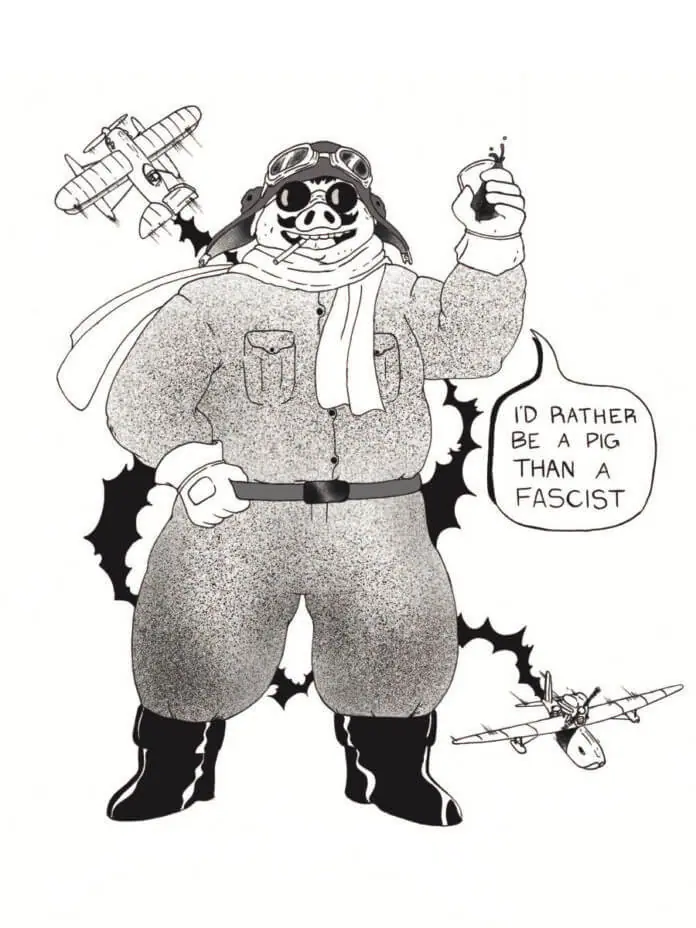The German word “Fingerspitzengefühl,” means “instinctive feel or feeling; tact and sensitivity, fine feeling.” I think it can also be applied to artists. The way a creator handcrafts a piece will inevitably leave fingerprints, and fine adjustments and patterns emerge in their work.
Hayao Miyazaki directs movies at Studio Ghibli, like The Boy And The Heron (2023) and Spirited Away (2001). His fingerprints generally consist of a fascination with the sky and airships, themes of pastoralism and strong anti-war messages. Porco Rosso (1992), often underrated, encapsulates these themes best within his oeuvre.
The film is set in the 1930’s above the Adriatic Sea. His version of the Adriatic is plagued by air pirates, nefarious scum who terrorize cruise ships from the sky. The scourge of these pirates is Porco Rosso, an anthropomorphic pig who flies a distinctive bright red plane and works as a stateless bounty hunter. The premise is certainly fantastical, but there are some notes of reality. Porco’s pigginess is related to the Great War (no spoilers) and the rising fascism in Italy, which Porco wholeheartedly rejects.
Speaking to a former comrade, and current Italian Air Force sergeant, who is urging Porco to re-enlist with the Italian Air Force, Porco replies, “Better a pig than a fascist.”
Porco is immediately identified by his distinctive red plane, a work of engineering mastery more than a machine designed for mass murder. Porco is a fighter pilot, a knight of the sky. The way that other characters speak of him deifies him as something more than the average man.
With his will, courage and spirit, he is the perfect archetype of a 1930’s fighter pilot.
Still, he seems most at peace falling asleep while being hit by a sunbeam in his little beach hideout with a bottle in one hand and a cigarette in the other. Porco has escaped the rat race so to speak, he lives in the country in content isolation. His words and actions reflect a deep fear of being hemmed in, something that fascist Italy would be sure to do.
Where Porco really wakes up is in the sky. Here, Miyazaki graces us with views of beautiful horizons, a serene sky dotted with clouds and an open ocean to explore. Rarely are Miyazaki films set in a true urban environment. Rather they are often structured around a desire to escape the rat race.
Porco is a known womanizer, bounty hunter and drunk, there’s a reason he was cursed with a pig’s head. What he’s not is a bad guy (at least from what we see in the film). His clear ideals of honour and respect clash with the rise of fascism in Italy. His place in the Adriatic gives him room to fly, hunt and drink as he sees fit. It’s not a stretch to say that a child who saw the destruction wrought by the rigid conformity of Japanese society during the Second World War and who was raised under the liberal influence of an occupying American military may have leaned toward the latter.
To be a heathen, a womanizer, a glutton—to be a pig is better than to be a fascist. Individuality is crucial to happiness but more importantly to character. To exist as just a stick in a larger bundle is to surrender yourself to the dominance of others (Despite what the Italian Fasces symbol of wooden rods, the root for the term fascist, might encourage). Instead, Miyazaki’s characters are brave, spirited and often loners. To say that this always brings happiness would be naive, but it never risks sacrificing principles, and that is a hill worth dying on.
It is better to be a pig than a fascist. That single line completely summarizes so much of Miyazaki’s work.
The freedom that rides on the shoulders of pilots is inherently opposed to fascism. A disdain for armed conflict would never be allowed to breathe in a fascist state but is a staple of Miyazaki films—better a pig than a fascist.


Recent Comments